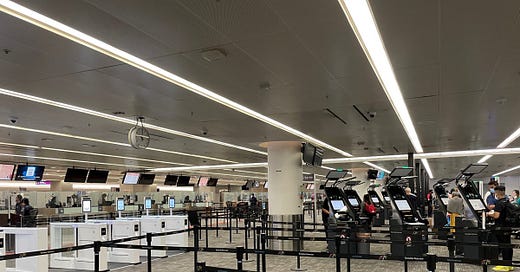Canada: The Unexceptional
The end of the Canadian consensus on immigration threatens one of our core shared myths.

By Kiran Gill
This October, Ashwin Annamalai was out for a walk in his Waterloo neighbourhood when a woman made an obscene gesture at him and told him to “go back to India”. The rising incidence of overt anti-immigrant hate in Canada is alarming. That anti-immigrant rhetoric in this country mirrors public opinion in the United States makes it all the more concerning. Canada has long tried to distinguish itself as a nation, both from its southern neighbour and European forefathers, by crafting a narrative that it remains more accepting and welcoming of diversity and immigration. As 2025 looms it is clear that Canada, like many of its contemporaries, is not open to immigration and that many Canadians feel as if Canada is “full.”
Attitudes towards immigration in the rest of the Western world are generally fickle. In times of economic prosperity immigrants are welcomed warmly, when there is an economic downturn immigrants are rebuked and reviled. Canada has long been considered an outlier to this paradigm; uniquely impervious to the forces of nativist populism. In other words, Canada has been perceived as exceptional when it comes to immigration and multiculturalism.
The shorthand argument for exceptionalism is as follows.
Canada is (as Justin Trudeau infamously proclaimed) a post-national society, where ethnic background has no importance.
Canada is a cultural mosaic that is limitlessly tolerant and inclusive.
Canada has a remarkable ability to seamlessly incorporate newcomers.
The argument for our exceptionalism may have held twenty years ago, but today it doesn't have a leg to stand on. The promise of a strong unified post-national society has been shattered as Canada has proven not to be so unrelentingly liberal. Canadians' rejection of increasingly permissive immigration policy is demonstrated not only by an increase in hate but also by a feeling amongst a broad cross-section of society that there are too many new people in the country. These changing attitudes are a consequence of integration failures. Newcomers have to be integrated into Canadian society, this involves participation in higher education, employment, political systems and the like. As Canadian political philosophers Charles Taylor and Will Kymlicka have pointed out, immigration in Canada was successful because of the happy marriage between multiculturalism and integration. Multiculturalism policy made Canadian institutions as flexible as possible because it offered new Canadians the path of least resistance to integration.
What happened to this fairytale model of immigration? In short, an extractivist short-term mindset prevailed over any concerns about the feasibility of integration. That Canada is a country built by immigrants is as true as ever. This is especially true of the economy. Someone with a cursory understanding of the interplay between the economy and immigration policy couldn't be faulted for thinking that adding more people to the Canadian stew is the cure for any economic bitterness. Presumably, this is exactly what the Trudeau government thought. From 2015 to 2024 permanent resident targets have jumped from 272,00 to 485,000. Over the same period, the number of temporary foreign workers (TFWs) and student visa holders (who often work) has more than doubled. Drastic increases in the number of people coming to Canada would be great, but Canada’s governing capacity has not grown in lockstep.
Canadian institutions are failing. Our once prized universal health care system serves a decreasing number of people, housing is increasingly unattainable, and necessities (such as groceries, cell phone service and transportation) are prohibitively expensive. The government does not have the capacity or guts to deal with the country's chronic ailments. This government (or the next one) has to remember that addressing the needs of Canadians is paramount. Canada does not have an immigration problem, it has a capacity problem. But immigrants, especially TFWs, have to stop being treated as a stop-gap measure. Sure, immigrants can help solve the capacity problem (hello foreign-trained doctors) but the ability of Canada's institutions to address the country's issues must be strengthened if large-scale immigration is to continue. Despite what some naysayers may think, Canada can and should be welcoming immigrants, but at the same time it needs to be a functioning nation.
It's no wonder that Canadians and the government (albeit very slowly) have turned against immigration. In the words of the former finance minister Chrystia Freeland “Canadians have been [going] through some tough times” and it is clear that the way immigration is currently structured is not helping. Canadians were exceptional when it comes to immigration, nevertheless, they still have their breaking point. Immigration policy cannot occur in a silo, if Canada is going to become bigger it must become better at the same time. Canada was an immigration unicorn, but the Trudeau government's inability to maintain and grow the country's institutions has upended the immigration consensus, leaving Canada as one among the herd.
Kiran Gill (he/him) is the Managing Editor of The Bell and an MPP Candidate at the Max Bell School of Public Policy. He is excited to lead The Bellwether team this year! At The Bell, Kiran is especially interested in telling stories about labour and indigenous policy. Prior to joining Max Bell Kiran worked in the federal public service.




Beautiful piece (analysis) @Kiran👌🏽